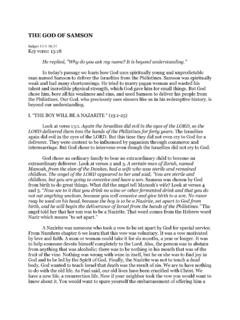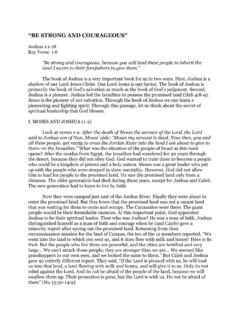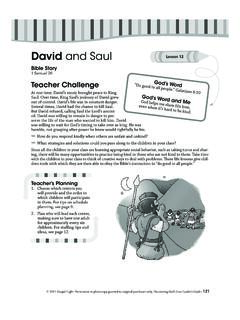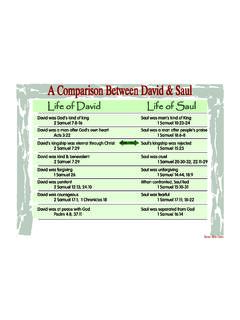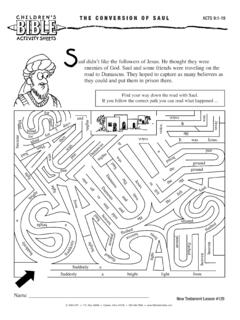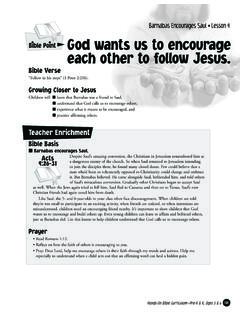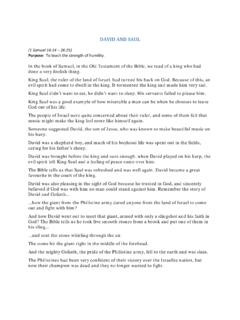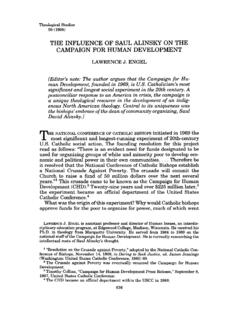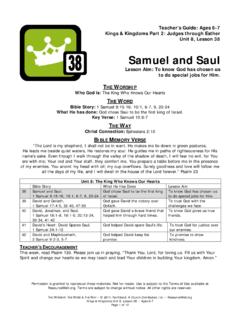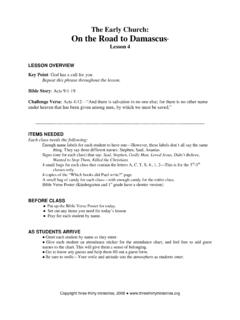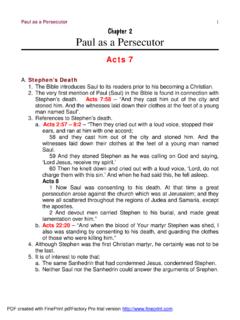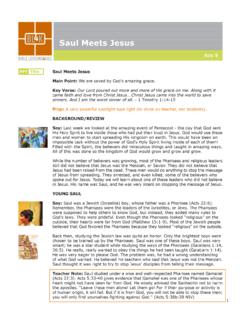Transcription of SAUL, THE FIRST KING OF ISRAEL
1 SAUL, THE FIRST KING OF ISRAEL 1 Samuel 10:1-11:15 Key Verse: 10:24 Samuel said to all the people, Do you see the man the Lord has chosen? There is no one like him among all the people. Then the people shouted, Long live the king! We may remember Saul as a small-minded king who was consumed with jealousy toward David and died in a battlefield by falling on his own sword. But his beginning wasn t like that. God chose him to be the FIRST king of ISRAEL . He was anointed by Samuel. He was tall and handsome. He was humble, even a little diffident, not confident about his worthiness to be a king. But God changed this man. The Spirit of God was upon him and he prophesied. He would rule ISRAEL for 42 years (13:1). I. GOD CHANGES SAUL S HEART (10:1-26) Look at verse 1. Then Samuel took a flask of oil and poured it on Saul s head and kissed him, saying, Has not the Lord anointed you leader over his inheritance?
2 Samuel anointed Saul to be the FIRST king of ISRAEL in obedience to God s directions. He poured oil on Saul s head and kissed him. He told Saul that the Lord had anointed him leader over his inheritance. This was a privately held ceremony to anoint Saul before God. There would also be a public coronation in Mizpah later. Samuel knew that Saul wasn t sure about God s calling for him to be a leader for ISRAEL . Saul needed assurance that this was indeed from God. So Samuel told Saul what would happen to him as he left Ramah that day. Two men near Rachel s tomb at Zelzah would tell him that his father s lost donkeys had been found and that his father was now worried about him (2). Three men at the great tree of Tabor (not Mt. Tabor) would greet him and offer him two loaves of bread (out of the three loaves they were carrying).
3 Above all, Saul would meet a group of prophets in Gibeah and the Spirit of the Lord would come upon him in power and he would prophesy with them and he would be changed into a different person (6). God would change Saul into a man of the Spirit to use him for his purpose. The Spirit of God can change any man into a different person to make him a spiritual leader. After the anointing ceremony, Samuel gave Saul some instructions. Look at verses 7-8. Once these signs are fulfilled, do whatever your hand finds to do, for God is with you. Go down ahead of me to Gilgal. I will surely come down to you to sacrifice burnt offerings and fellowship offerings, but you must wait seven days until I come to you and tell you what you are to do. From that time on, God would be with Saul in 2 whatever he would do.
4 But it was important for him to follow God s words, given by his spiritual advisor, Samuel. So how were the signs fulfilled? Verse 9 says that as Saul turned to leave Samuel, God changed Saul s heart, and all these signs were fulfilled that day. God changed Saul s heart. All the signs that Samuel had told him were fulfilled that day. When he met a group of prophets in Gibeah, the Spirit of God came upon him in power and he joined in their prophesying. What does it mean Saul prophesied? A prophet in the Bible is not like Nostradamus (1503-66) who predicted many future world events. A prophet in a biblical sense is not a fortune teller. Rather, a prophet is a Bible teacher. A prophet teaches the word of God and inspires people to obey him. It is true that God used the prophets like Daniel, Ezekiel and Isaiah to predict future events, but more importantly they delivered the word of God to his people to encourage, admonish and warn them.
5 This is what St. Paul said, .. everyone who prophesies speaks to men for their strengthening, encouragement and comfort. He who speaks in a tongue edifies himself, but he who prophesies edifies the church (1Co 14:3-4). When Saul joined them in prophesying, the prophets were surprised, knowing his family background. They didn t consider Kish and his son to be so spiritual and know the word of God. Kish and Saul were not known to be Bible scholars by any means. So the prophets said, This man knows the word of God. That can t be Saul. We know the family of Kish. They did not realize that God had changed Saul s heart. The Spirit of God can change a person. God changed Chris Sherrill. If his old friends met him today, they would say, That can t be Chris. He knows the word of God.
6 He can t be the man we used to hang out with at the watering holes of Hagerstown. After Saul stopped prophesying, he went to the high place (13).1 Then his uncle came to meet him. Saul told him about meeting Samuel, but he did not mention his kingship. Saul wasn t 100% sure about God s plan for him yet. He wasn t willing to share with his uncle about what Samuel had said about the kingship. Look at verse 17. Samuel summoned the people of ISRAEL to the Lord at Mizpah. This was the place where they repented their sins and experienced a spiritual revival after their humiliating defeat by the Philistines. Samuel chose the historic place to publicly announce God s selection of their FIRST king. But FIRST , Samuel rebuked them for their rejection of God s rule over them. He reminded them how God brought them out of their slavery in Egypt (18).
7 They had no king to rule over them. God was their king and he sent his servant Moses to be their shepherd. And God 1 Saul would prophesy once again later when the Spirit of God came upon him (19:23-24). Meanwhile, however, Saul would become proud before God and disobey him. The Spirit of God would d epart from Saul and an evil spirit from the Lord would torment him (16:14). His downfall was inevitable when the Spirit departed from him. 3 delivered them from the power of Egypt and all the kingdoms that oppressed them. But they rejected God who saved them out of all their calamities and distresses when they said, No, set a king over us (19). This was the second time God reminded them of his delivery from their slavery in Egypt.
8 This was a history lesson. He was asking them, How have I failed you that you are asking for a king now? Even as God allowed them to have a king, he was saying to them, Don t forget this even after you get a king. Our God is a God of history. He has a track record. We must have a sense of history. We must remember how God delivered us from our own slavery to sin and death. As someone said, Those who ignore history are doomed to repeat it. At Mizpah, Samuel conducted a formal selection process to choose a king. It wasn t a democratic election process that we have today. Instead, the selection was done by lot (20-24). This was to show that the king would be chosen by God himself. And indeed, Saul was chosen by lot. This political process was for the people of ISRAEL . Samuel had already anointed him as king in a private ceremony.
9 Samuel wanted the people to know that God himself had chosen Saul as their king. But there was a problem. When the winner was announced, the chosen man was not found. The Lord had to tell them, He has hidden himself among the baggage. Saul wasn t still sure if he was the one, despite the signs. (We have to ask ourselves, Are we also reluctant to accept God s calling, hiding behind some emotional and human baggage? ) When they brought him out, he stood among the people as he was a head taller than any of the others. Samuel said to all the people, Do you see the man the Lord has chosen? There is no one like him among all the people. Then the people shouted, Long live the king! (24) Samuel obeyed God, even though personally he did not like the idea of anointing a king over his people.
10 He gave a 100% endorsement for Saul. But he also explained to the people the regulations of the kingship. He wrote them down on a scroll and deposited it before the Lord, before dismissing the people (25). God s regulations of the kingship are outlined in Deuteronomy 17:14-20. There were nine requirements of the king. The FIRST four dealt with human aspects of the kingship. He must be an Israelite who owned not too many horses, not too many wives and no large amounts of silver and gold. The last five were about the king s spiritual life. He must keep the law with him, read it all the days of his life, learn to revere God s word and follow it, and not consider himself better than his brothers. To summarize, the king of God s people must be different from worldly kings. Worldly rulers exercise their power over their people.


